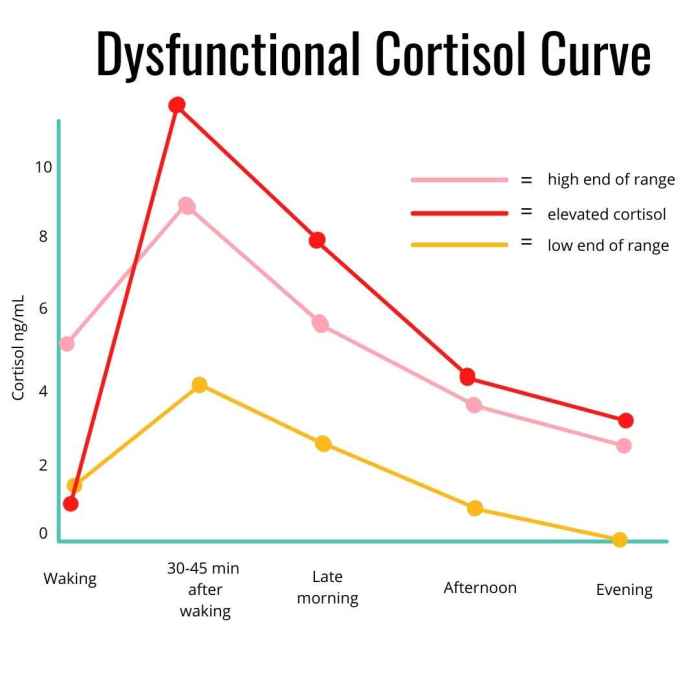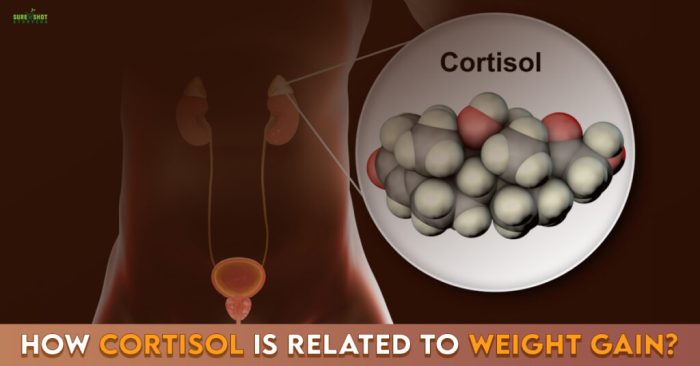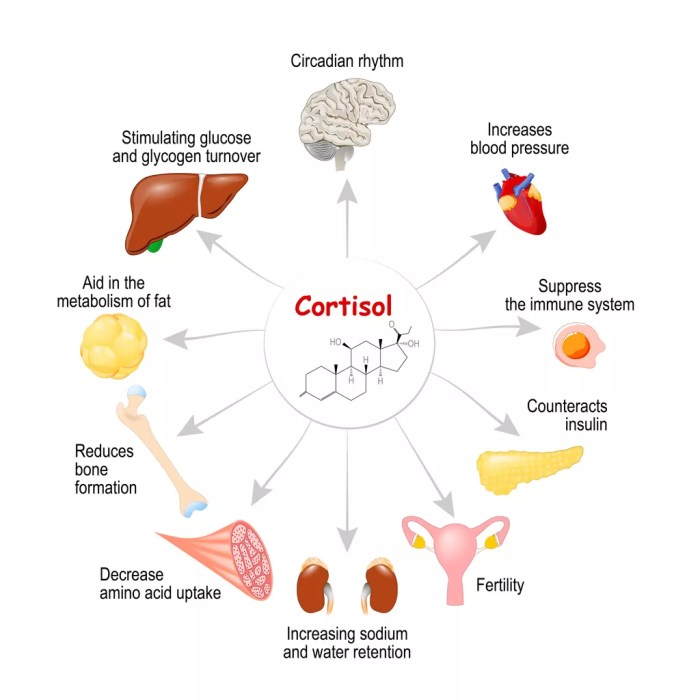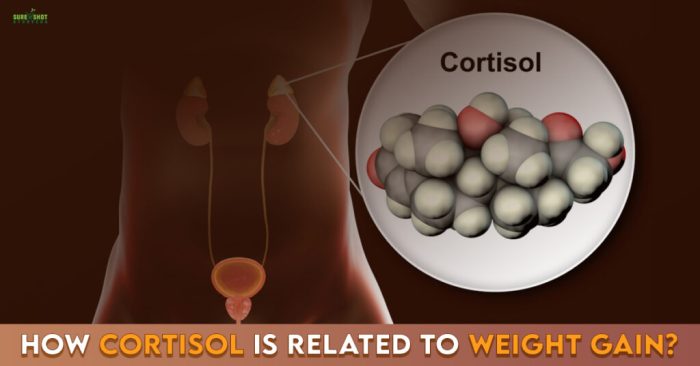How to lower cortisol is a crucial question for anyone experiencing stress or its negative health effects. This comprehensive guide dives deep into understanding the complexities of cortisol, identifying potential causes of elevated levels, and exploring natural and lifestyle adjustments for effective management. We’ll cover everything from understanding cortisol’s role in the body to specific dietary considerations and the potential role of supplements.
Get ready to discover the path to better cortisol control!
This in-depth exploration will guide you through various methods for managing your cortisol levels, from understanding the science behind cortisol production to practical strategies for stress reduction and lifestyle modifications. We will also discuss the crucial role of professional guidance and when to seek medical intervention.
Understanding Cortisol
Cortisol, often dubbed the “stress hormone,” plays a crucial role in regulating numerous bodily functions. It’s vital for maintaining blood sugar levels, controlling inflammation, and supporting the body’s response to stress. However, an imbalance in cortisol production can lead to various health issues. Understanding its production cycle and the consequences of elevated levels is key to managing overall well-being.Cortisol is a steroid hormone produced primarily by the adrenal cortex, a part of the adrenal glands located on top of the kidneys.
Its production is intricately linked to the hypothalamic-pituitary-adrenal (HPA) axis, a complex system that coordinates the body’s response to stress. The HPA axis regulates the release of cortisol in a cyclical pattern, ensuring its availability throughout the day.
Cortisol Production Cycle
The typical cortisol production cycle follows a diurnal rhythm, meaning it fluctuates throughout the day. Levels are typically highest in the early morning, peaking just before waking, and gradually decrease throughout the day. This natural fluctuation is essential for optimal bodily functions. Factors like sleep, diet, and exercise influence this rhythm.
Consequences of Elevated Cortisol Levels
Prolonged or elevated cortisol levels can have detrimental effects on various bodily systems. Symptoms can include fatigue, difficulty sleeping, mood swings, anxiety, and weakened immune function. Chronic stress and consequent high cortisol levels can contribute to various health problems, including cardiovascular issues, metabolic disorders, and even mental health conditions. Individuals experiencing persistent elevated cortisol should consult a healthcare professional.
Lowering cortisol levels is crucial for overall well-being, and one way to approach this is by managing stress. However, a less-than-ideal example of a reaction that can significantly elevate stress hormones is mixing bleach and ammonia, which creates toxic fumes. Understanding the dangers of such chemical reactions can help you avoid situations that trigger excessive cortisol release, like mixing bleach and ammonia.
Ultimately, finding healthy stress management techniques is key to keeping cortisol levels in check.
Cortisol Measurement Methods
Several methods exist for measuring cortisol levels, each with its own advantages and disadvantages. These methods can provide valuable insights into the body’s hormonal balance and identify potential issues. Choosing the right method depends on the specific needs of the individual and the context of the assessment.
Comparison of Cortisol Measurement Methods
| Method | Procedure | Accuracy | Cost |
|---|---|---|---|
| Saliva | A small sample of saliva is collected at specific times throughout the day, typically at various points of the day, often including the morning and evening, and then analyzed for cortisol levels. | Generally good, especially for assessing diurnal rhythm; can be influenced by factors like oral hygiene and recent food/drink intake. | Moderate |
| Blood | A blood sample is collected, and cortisol levels are measured in the serum or plasma portion of the blood. | Generally considered highly accurate for reflecting cortisol levels at a specific point in time. | High |
| Urine | A urine sample is collected over a 24-hour period, and cortisol levels are measured in the collected urine. | Good for reflecting overall cortisol levels over a 24-hour period; can be influenced by fluid intake and other factors. | Moderate |
Identifying Causes of High Cortisol
High cortisol levels, often a result of chronic stress, can significantly impact overall health and well-being. Understanding the factors contributing to elevated cortisol is crucial for developing effective strategies to manage and reduce it. Identifying the root causes allows for targeted interventions to restore hormonal balance and improve quality of life.Elevated cortisol isn’t simply a response to a single event; it’s often a consequence of ongoing stressors, lifestyle choices, and underlying health conditions.
Recognizing these contributing factors is the first step towards reclaiming hormonal equilibrium.
Stress and Cortisol Production
Chronic stress, whether stemming from work, relationships, or financial pressures, significantly impacts cortisol levels. The body’s stress response system, designed for short-term challenges, can become dysregulated with prolonged exposure to stressors. This sustained activation leads to persistently high cortisol, disrupting various bodily functions. Examples include individuals experiencing job insecurity, relationship conflicts, or major life transitions like relocation.
Diet and Cortisol Levels
Dietary choices play a critical role in cortisol regulation. A diet high in processed foods, refined sugars, and unhealthy fats can contribute to fluctuating cortisol levels. Conversely, a diet rich in whole foods, fruits, vegetables, and lean proteins can promote hormonal stability. Poor dietary choices lead to unstable blood sugar levels, which can trigger cortisol spikes. A well-balanced diet is crucial for maintaining stable cortisol levels.
Sleep Deprivation and Poor Sleep Quality
Sleep deprivation and poor sleep quality significantly impact cortisol levels. Adequate sleep is essential for cortisol regulation. During sleep, the body repairs and restores itself, including regulating hormone production. Chronic sleep disturbances disrupt this process, leading to elevated cortisol levels. This can manifest in individuals experiencing insomnia, frequent awakenings, or consistently insufficient sleep duration.
Cortisol and Other Health Conditions
High cortisol levels can contribute to or exacerbate various health issues, including anxiety disorders, depression, and even weakened immune function. The chronic activation of the stress response system can lead to imbalances in other hormones, further impacting health. For example, individuals experiencing chronic anxiety often exhibit elevated cortisol levels. Furthermore, certain medical conditions like Cushing’s syndrome can cause abnormally high cortisol levels.
Lifestyle Factors Influencing Cortisol
Numerous lifestyle factors influence cortisol levels. Regular exercise, mindfulness practices, and social support systems are crucial for maintaining healthy cortisol levels. Lack of these can lead to increased stress and elevated cortisol.
- Regular Exercise: Physical activity helps regulate the body’s stress response, promoting a healthy cortisol balance.
- Mindfulness and Relaxation Techniques: Practices like meditation and deep breathing can help manage stress and reduce cortisol levels.
- Social Support: Strong social connections and supportive relationships can buffer the impact of stress on cortisol.
- Sufficient Sunlight Exposure: Sunlight helps regulate the body’s natural circadian rhythm, impacting cortisol production.
- Adequate Hydration: Proper hydration is crucial for various bodily functions, including stress response regulation.
Natural Methods for Lowering Cortisol
Managing cortisol levels naturally is crucial for overall well-being. High cortisol can lead to a range of health issues, from mood swings and anxiety to sleep disturbances and digestive problems. Fortunately, several natural strategies can help regulate cortisol and improve your body’s natural balance. By incorporating these practices into your daily routine, you can take proactive steps towards managing your stress response and promoting a healthier lifestyle.
Natural Techniques for Managing Cortisol Levels
Numerous natural approaches can support cortisol regulation. These methods often work by promoting relaxation, reducing stress, and improving overall well-being. Adopting these techniques can contribute to a more balanced and healthier response to stress.
- Exercise: Regular physical activity is a powerful tool for lowering cortisol levels. Exercise triggers the release of endorphins, which have mood-boosting effects and help counter the stress response. Moderate-intensity exercise, such as brisk walking, jogging, swimming, or cycling, for 30 minutes most days of the week can significantly reduce cortisol levels. For instance, a study published in the Journal of Sports Medicine found that individuals who engaged in regular exercise had lower cortisol levels compared to those who did not exercise.
- Mindfulness and Meditation: Mindfulness practices, such as meditation, help train the mind to focus on the present moment. This reduces the tendency to dwell on stressors and promotes a sense of calm. By focusing on the breath and observing thoughts without judgment, individuals can effectively regulate their emotional response to stress, thereby lowering cortisol levels. Numerous studies have demonstrated the effectiveness of mindfulness and meditation in reducing cortisol levels and improving overall mental well-being.
- Sufficient Sleep: Adequate sleep is essential for cortisol regulation. During sleep, the body repairs and restores itself, and cortisol levels naturally decrease. Aim for 7-9 hours of quality sleep each night to support your body’s natural cortisol rhythm. Chronic sleep deprivation disrupts this rhythm, leading to elevated cortisol levels. Lack of sleep can negatively affect many bodily functions, including hormone regulation.
- Dietary Changes: A balanced diet rich in whole foods, fruits, vegetables, and lean proteins can contribute to lower cortisol levels. Limit processed foods, sugary drinks, and excessive caffeine, as these can exacerbate stress responses. A diet rich in nutrients provides the body with the resources it needs to cope with stress more effectively. For instance, consuming foods rich in magnesium, like leafy greens and nuts, may help regulate cortisol levels.
- Relaxation Techniques: Incorporating relaxation techniques, such as deep breathing, progressive muscle relaxation, and yoga, can help lower cortisol levels and promote overall relaxation. These techniques directly address the physical and mental components of stress, promoting a sense of calm and well-being. These practices help to regulate the nervous system, reducing the body’s stress response.
Effects of Exercise on Cortisol Levels
Exercise plays a crucial role in regulating cortisol levels. Physical activity triggers the release of endorphins, which have mood-boosting effects and help counter the stress response. Regular exercise helps to lower cortisol levels by promoting overall well-being and resilience to stress. Studies have consistently shown a correlation between regular exercise and lower cortisol levels.
Mindfulness and Meditation for Cortisol Regulation
Mindfulness and meditation practices offer a powerful tool for regulating cortisol levels. These techniques help train the mind to focus on the present moment, reducing the tendency to dwell on stressors. By focusing on the breath and observing thoughts without judgment, individuals can effectively regulate their emotional response to stress, thereby lowering cortisol levels. Mindfulness-based interventions have proven effective in reducing stress and anxiety, thereby lowering cortisol.
The Role of Sufficient Sleep in Cortisol Regulation
Adequate sleep is essential for cortisol regulation. During sleep, the body repairs and restores itself, and cortisol levels naturally decrease. Chronic sleep deprivation disrupts this natural rhythm, leading to elevated cortisol levels. Prioritizing sleep can significantly impact cortisol regulation and overall well-being.
Dietary Changes for Lowering Cortisol
A balanced diet plays a crucial role in cortisol regulation. A diet rich in whole foods, fruits, vegetables, and lean proteins provides the body with the nutrients it needs to cope with stress more effectively. Limiting processed foods, sugary drinks, and excessive caffeine can help mitigate stress responses. Proper nutrition can have a significant impact on cortisol levels and overall health.
Benefits of Relaxation Techniques
Relaxation techniques provide a direct approach to managing stress and lowering cortisol levels. These techniques address both the physical and mental components of stress, promoting a sense of calm and well-being. By reducing physical tension and promoting mental clarity, relaxation techniques can help regulate the nervous system, reducing the body’s stress response.
Comparison of Relaxation Techniques
| Technique | Description | Benefits | Examples |
|---|---|---|---|
| Deep Breathing | Focusing on slow, deep inhalations and exhalations. | Reduces anxiety, lowers heart rate, promotes relaxation. | Diaphragmatic breathing, box breathing. |
| Progressive Muscle Relaxation | Systematically tensing and relaxing different muscle groups. | Reduces muscle tension, promotes relaxation, lowers blood pressure. | Specific exercises targeting various muscle groups. |
| Yoga | Combining physical postures (asanas), breathing techniques (pranayama), and meditation. | Improves flexibility, strength, balance, reduces stress, promotes relaxation. | Various styles of yoga (Hatha, Vinyasa, Yin). |
Lifestyle Adjustments for Cortisol Management: How To Lower Cortisol
Understanding the root causes of high cortisol is crucial, but effectively managing its impact requires practical lifestyle adjustments. These adjustments aren’t just about feeling better; they’re about creating a sustainable foundation for long-term well-being and reducing the chronic stress that fuels elevated cortisol levels. This approach focuses on proactive steps that integrate healthy habits into your daily routine, promoting a calmer, more balanced internal environment.Stress management is a critical component of regulating cortisol.
Chronic stress keeps the body in a heightened state of alert, leading to sustained cortisol production. By implementing effective stress management techniques, individuals can help to lower cortisol levels and promote overall health and well-being.
Stress Management Techniques
Effective stress management involves a multifaceted approach that goes beyond simply avoiding stressful situations. It includes developing coping mechanisms to navigate challenging circumstances and maintain a sense of calm amidst daily pressures. Proactive strategies are essential to prevent chronic stress from impacting cortisol levels.
- Mindfulness and Meditation: Practicing mindfulness and meditation techniques can help individuals become more aware of their thoughts and feelings without judgment. This awareness allows for a more measured response to stressors. Mindfulness involves paying attention to the present moment without getting caught up in worries about the past or anxieties about the future. This can lead to a more balanced emotional response, helping to regulate cortisol levels.
- Deep Breathing Exercises: Deep breathing exercises are simple yet powerful tools for managing stress. By focusing on controlled breathing, individuals can calm the nervous system and reduce the physiological response to stress, including the release of cortisol. Incorporating these exercises into daily routines can help maintain a sense of calm and stability.
- Progressive Muscle Relaxation: Progressive muscle relaxation involves systematically tensing and releasing different muscle groups in the body. This technique helps to release physical tension, which is often associated with stress. By reducing physical tension, individuals can reduce the physiological responses that lead to cortisol production.
Managing Daily Stress
Effective daily stress management requires a proactive approach, focusing on strategies to minimize stressors and develop healthy coping mechanisms. A mindful approach to daily tasks can significantly reduce the negative impact of stress on cortisol levels.
- Time Management: Prioritizing tasks, setting realistic deadlines, and breaking down large projects into smaller, manageable steps can help reduce feelings of overwhelm. This organization helps to control the feeling of being constantly behind schedule, a major source of stress.
- Establishing Boundaries: Setting clear boundaries in personal and professional life is essential. Learning to say no to commitments that feel overwhelming or detract from well-being can significantly reduce stress levels. This involves recognizing personal limits and not overcommitting.
- Scheduling Relaxation Time: Incorporating dedicated time for relaxation and rejuvenation into the daily schedule is crucial. Activities like reading, listening to music, spending time in nature, or pursuing hobbies can help reduce stress and promote a sense of well-being.
Importance of Sleep
Adequate sleep is essential for cortisol regulation. When sleep is disrupted, cortisol levels can rise, leading to various health issues. Maintaining a consistent sleep schedule is crucial for optimal cortisol management.
- Consistent Sleep Schedule: Maintaining a regular sleep schedule, even on weekends, helps regulate the body’s natural sleep-wake cycle, improving sleep quality and reducing cortisol levels.
- Creating a Relaxing Bedtime Routine: Establishing a relaxing bedtime routine, such as taking a warm bath, reading, or practicing gentle stretches, can help signal to the body that it’s time to wind down and prepare for sleep.
- Creating a Conducive Sleep Environment: Creating a dark, quiet, and cool sleep environment is important for promoting better sleep quality. This includes minimizing light and noise exposure, ensuring comfortable bedding, and maintaining a comfortable temperature.
Importance of Physical Activity
Regular physical activity plays a vital role in managing cortisol levels. Exercise helps reduce stress hormones and promote relaxation. Finding activities that you enjoy is key to sustaining a regular exercise routine.
- Regular Exercise: Engaging in regular physical activity, such as brisk walking, jogging, swimming, or yoga, can help lower cortisol levels and improve overall well-being. The benefits of exercise extend beyond physical health, impacting mental and emotional well-being.
- Choosing Activities You Enjoy: Finding activities you genuinely enjoy is crucial for sustaining a regular exercise routine. This helps maintain motivation and encourages long-term adherence.
Social Support and Self-Care
Strong social support networks can provide a buffer against stress. Prioritizing self-care activities is essential for maintaining emotional well-being and reducing cortisol levels.
- Building a Support System: Maintaining strong social connections and support systems can help individuals cope with stress more effectively. Sharing concerns and experiences with trusted friends or family can provide valuable emotional support.
- Prioritizing Self-Care Activities: Incorporating activities that promote self-care, such as spending time in nature, pursuing hobbies, or engaging in relaxation techniques, can help reduce stress and lower cortisol levels.
Strategies for Building Stress Resilience
Building stress resilience involves developing coping mechanisms to effectively manage stress. A proactive approach is essential to prevent stress from negatively impacting cortisol levels.
| Strategy | Description | Implementation | Benefits |
|---|---|---|---|
| Mindfulness Meditation | Focus on the present moment | Daily practice of 5-10 minutes | Reduced stress response, improved focus |
| Deep Breathing Exercises | Calming the nervous system | Incorporate into daily routine | Lowered heart rate, reduced anxiety |
| Time Management | Prioritize tasks, set realistic deadlines | Use planners, prioritize tasks | Reduced feelings of overwhelm, increased productivity |
| Healthy Diet | Nourish the body | Focus on whole foods, limit processed foods | Improved energy levels, reduced cravings |
| Regular Sleep | Regulate the body’s natural rhythms | Maintain consistent sleep schedule | Improved mood, increased cognitive function |
Dietary Considerations for Cortisol Reduction
Nourishing your body with the right foods plays a crucial role in managing cortisol levels. A balanced diet, rich in specific nutrients, can help regulate cortisol production and reduce its harmful effects. Conversely, certain dietary choices can exacerbate cortisol imbalances, leading to heightened stress responses. This section delves into the specific dietary components that impact cortisol levels and provides actionable strategies for creating a cortisol-friendly diet.
Foods That Support Healthy Cortisol Levels
A diet rich in whole, unprocessed foods forms the cornerstone of a cortisol-supportive strategy. These foods offer essential nutrients that help the body manage stress and maintain healthy hormone levels. These include:
- Fruits and Vegetables:
- Lean Protein Sources:
- Complex Carbohydrates:
Fruits and vegetables are packed with vitamins, minerals, and antioxidants that help combat oxidative stress, a key contributor to elevated cortisol. A variety of colorful produce provides a range of nutrients crucial for overall health, contributing to a well-regulated stress response. Berries, leafy greens, and citrus fruits are particularly beneficial.
Protein is essential for building and repairing tissues. Lean protein sources, such as poultry, fish, beans, and lentils, provide sustained energy without contributing to blood sugar spikes, which can negatively impact cortisol levels.
Whole grains, quinoa, and brown rice are complex carbohydrates that release energy slowly, maintaining stable blood sugar levels and preventing the cortisol fluctuations that often accompany blood sugar crashes.
Importance of a Balanced Diet
Maintaining a balanced diet is vital for regulating cortisol levels. A balanced diet encompasses a variety of foods from all food groups, ensuring the body receives the necessary nutrients for optimal function. This includes adequate protein, healthy fats, complex carbohydrates, vitamins, and minerals. A balanced diet supports the body’s natural stress response mechanisms, minimizing the need for excessive cortisol production.
The absence of critical nutrients can negatively impact the body’s ability to cope with stress.
Impact of Processed Foods on Cortisol Levels
Processed foods are often high in sugar, unhealthy fats, and artificial ingredients. These ingredients can disrupt blood sugar levels, leading to fluctuations in cortisol production. These spikes and crashes in blood sugar trigger the body’s stress response, often leading to increased cortisol secretion. Furthermore, the lack of essential nutrients in processed foods contributes to nutrient deficiencies, which further impact the body’s ability to manage stress.
Consuming processed foods can exacerbate existing cortisol imbalances and lead to increased stress levels.
Benefits of Magnesium and Vitamin C
Magnesium and vitamin C are essential nutrients that play a crucial role in regulating cortisol levels. Magnesium is a crucial component of numerous enzymatic reactions, including those involved in cortisol metabolism. Vitamin C acts as an antioxidant, protecting cells from damage caused by oxidative stress, which is often associated with elevated cortisol. Incorporating magnesium-rich foods, such as leafy greens, nuts, and seeds, and vitamin C-rich foods, like citrus fruits and berries, into your diet can be beneficial in regulating cortisol levels.
Effects of Caffeine and Alcohol on Cortisol
Caffeine, a stimulant, can temporarily increase cortisol levels. This is because caffeine activates the body’s fight-or-flight response. While the initial effect may be a boost in energy, prolonged caffeine intake can lead to chronic stress and elevated cortisol levels. Alcohol consumption can also impact cortisol levels, although the effects are more complex and vary depending on individual factors and the amount consumed.
Excessive alcohol consumption can disrupt sleep patterns and increase stress, which can lead to elevated cortisol. Moderation is key when it comes to both caffeine and alcohol.
Finding ways to lower cortisol levels is key for overall well-being. A healthy diet, regular exercise, and sufficient sleep are often recommended, but sometimes you might wonder if certain supplements can help. For example, understanding if a product like Emergen-C actually helps manage stress hormones is important. Does Emergen C work in reducing cortisol levels?
Ultimately, a holistic approach focusing on lifestyle choices will often yield the best results for managing cortisol.
Dietary Considerations Table
| Food | Benefits | Potential impact on cortisol | Portion size recommendations |
|---|---|---|---|
| Leafy greens (spinach, kale) | Rich in magnesium, vitamins, and antioxidants | Supports cortisol regulation, combats oxidative stress | 1-2 cups per day |
| Fatty fish (salmon, tuna) | Excellent source of omega-3 fatty acids | Reduces inflammation, supports healthy hormone function | 3-4 ounces per serving |
| Bananas | Rich in potassium and carbohydrates | Maintains stable blood sugar, provides sustained energy | 1-2 bananas per day |
| Berries | High in antioxidants and vitamins | Combats oxidative stress, supports immune function | 1/2 cup per serving |
| Dark chocolate (70% cacao or higher) | Rich in antioxidants and flavonoids | May have a calming effect, supports healthy blood flow | 1-2 squares per day |
| Nuts and seeds | Good source of healthy fats, magnesium, and protein | Supports healthy hormone function, regulates blood sugar | 1/4 cup per serving |
| Brown rice | Complex carbohydrate, good source of fiber | Maintains stable blood sugar, provides sustained energy | 1/2 cup per serving |
| Poultry | Lean protein source | Provides essential amino acids, supports tissue repair | 3-4 ounces per serving |
| Processed foods | High in sugar, unhealthy fats, and artificial ingredients | Disrupts blood sugar, increases stress response | Limit consumption |
| Caffeine | Stimulant | Temporarily increases cortisol, can lead to chronic stress with excessive intake | Limit to moderate amounts |
Supplements and Medications for Cortisol Management
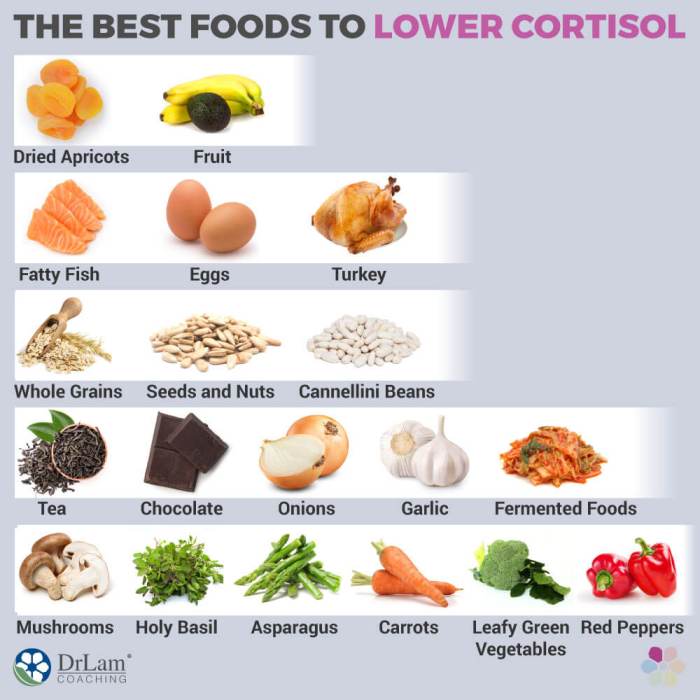
Managing high cortisol levels can sometimes necessitate the use of supplements and, in certain cases, medications. While lifestyle changes and dietary adjustments are often the first line of defense, supplements and medications can play a supportive role in reducing cortisol levels and alleviating associated symptoms. However, it’s crucial to remember that these options should be considered in conjunction with medical advice and not as a replacement for a comprehensive approach to cortisol management.Supplementing with certain substances can potentially aid in cortisol regulation, but individual responses vary significantly.
Consult with a healthcare professional before starting any new supplement regimen, especially if you have underlying health conditions or are taking other medications. Understanding the potential benefits and risks associated with each supplement is essential for informed decision-making.
Supplements That May Help Regulate Cortisol
Many supplements are purported to help manage cortisol levels, but scientific evidence supporting their effectiveness varies. Some commonly discussed supplements include ashwagandha, magnesium, vitamin C, and adaptogens like Rhodiola. These substances may help modulate the stress response and reduce cortisol production, but more research is needed to fully understand their mechanisms and optimal dosage.
- Ashwagandha: This Ayurvedic herb is frequently touted for its stress-reducing properties. Some studies suggest it may help lower cortisol levels and improve sleep quality. However, more rigorous clinical trials are necessary to establish definitive conclusions.
- Magnesium: Magnesium plays a crucial role in numerous bodily functions, including stress response regulation. A deficiency in magnesium can contribute to elevated cortisol levels. Supplementation may help maintain healthy cortisol levels, though the specific impact on cortisol production needs further investigation.
- Vitamin C: Vitamin C is an important antioxidant that can potentially help mitigate the effects of stress on the body. Studies have shown a correlation between vitamin C levels and cortisol responses, but more research is needed to determine the precise impact of supplementation on cortisol levels.
- Adaptogens (Rhodiola): Adaptogens are believed to help the body adapt to stress. Rhodiola, for example, is often promoted for its ability to reduce stress-related symptoms, potentially influencing cortisol levels. However, the effectiveness of adaptogens varies depending on the individual and the specific type of adaptogen.
Potential Benefits and Risks of Using Supplements
Supplement use for cortisol management can yield various benefits, such as potentially mitigating stress-related symptoms and contributing to overall well-being. However, it’s essential to acknowledge the potential risks. Some supplements may interact with other medications, and certain individuals may experience adverse reactions. Consult a healthcare professional to assess the suitability and safety of any supplement for your specific needs.
- Potential Benefits: Supplements may help reduce stress, improve sleep, and potentially lower cortisol levels. However, individual results can vary greatly.
- Potential Risks: Interactions with medications, allergic reactions, and potential side effects are possible. Always consult a healthcare professional before starting any supplement regimen.
Herbal Remedies for Cortisol Management
Herbal remedies, like those mentioned previously, are often used to help manage stress and cortisol levels. It’s crucial to remember that these remedies are not a substitute for medical advice and should be used with caution, particularly if you have underlying health conditions.
Finding ways to lower cortisol levels can be a real challenge, but it’s definitely achievable! One aspect of overall wellness that often gets overlooked is the impact of stress on your body. Knowing what to expect during an IUD insertion can help reduce anxiety surrounding the procedure, which in turn can help lower cortisol. For more detailed information, check out this helpful resource about what to expect during an IUD insertion.
Ultimately, prioritizing self-care and stress-reduction techniques is key to managing cortisol levels effectively.
- Ashwagandha: This herb is a popular choice for stress reduction, potentially influencing cortisol levels. However, more robust research is needed to validate its effectiveness and potential risks in different populations.
- Other Herbal Remedies: Other herbal remedies like chamomile and lavender are sometimes used for their calming effects, which may indirectly affect cortisol levels. Consult with a healthcare professional before incorporating herbal remedies into your routine.
Role of Prescribed Medications in Managing Cortisol
In some cases, prescribed medications may be necessary to manage high cortisol levels. These medications typically target the underlying cause of the elevated cortisol, such as in conditions like Cushing’s syndrome. A healthcare professional can assess the necessity and appropriateness of medication based on individual circumstances.
Comparison of Different Supplements for Cortisol Reduction
| Supplement | Potential Benefits | Potential Risks | Dosage |
|---|---|---|---|
| Ashwagandha | May help reduce stress and lower cortisol levels. | Possible interactions with medications, digestive issues in some individuals. | Typically 300-500 mg daily. |
| Magnesium | May support healthy cortisol levels and stress response. | Diarrhea, nausea, or other digestive upset at higher doses. | Generally 300-400 mg daily, but consult a healthcare professional. |
| Vitamin C | May act as an antioxidant, potentially mitigating stress effects. | Potential for digestive issues, interaction with certain medications. | Typically 500-1000 mg daily. |
| Rhodiola | May help the body adapt to stress, potentially influencing cortisol. | Possible anxiety, insomnia, or digestive issues in some individuals. | Typically 200-400 mg daily. |
Seeking Professional Guidance
High cortisol levels can significantly impact your overall well-being, and understanding the nuances of your situation is crucial for effective management. While natural methods and lifestyle adjustments are often beneficial, there are instances where professional medical intervention is essential. Seeking guidance from a healthcare professional can help you navigate the complexities of cortisol management and ensure you’re taking the most appropriate steps for your unique needs.A healthcare professional can provide a comprehensive assessment, identify underlying causes, and recommend tailored solutions, whether it’s dietary adjustments, specific supplements, or even medication.
They can also monitor your progress and adjust strategies as needed, ensuring your health and well-being are prioritized.
Importance of Consulting a Healthcare Professional
Consulting a healthcare professional is paramount when experiencing persistent or severe symptoms related to high cortisol levels. This includes chronic fatigue, unexplained weight changes, muscle weakness, or other signs indicative of a potential underlying condition. A healthcare professional can accurately diagnose the root cause and develop a personalized management plan.
Situations Requiring Medical Intervention
Medical intervention might be necessary in cases where high cortisol levels are linked to an underlying medical condition, such as Cushing’s syndrome, adrenal tumors, or other hormonal imbalances. Symptoms like excessive thirst, frequent urination, or unexplained weight gain could signal a need for immediate medical attention. Furthermore, if natural methods and lifestyle changes fail to significantly reduce cortisol levels, seeking professional medical advice is crucial.
Role of a Doctor in Managing Cortisol Levels
A healthcare professional, particularly an endocrinologist or a physician specializing in internal medicine, plays a vital role in cortisol management. They can conduct thorough evaluations, including blood tests, imaging scans, and hormone level assessments, to accurately diagnose the source of elevated cortisol. They can then create a comprehensive treatment plan, which may include medication, dietary modifications, or lifestyle adjustments.
This personalized approach ensures the most effective management strategy for individual needs.
Questions to Ask a Doctor About Cortisol Management, How to lower cortisol
A proactive approach to your health involves asking the right questions to your healthcare provider. Here are some crucial inquiries for a comprehensive understanding of cortisol management:
- What are the potential underlying causes of my high cortisol levels?
- What diagnostic tests are necessary to confirm the cause?
- What lifestyle changes can I make to help manage my cortisol levels?
- Are there any dietary recommendations I should follow?
- What are the potential side effects of any medications or supplements?
- What is the expected timeframe for improvement, and how will we monitor my progress?
- Are there any specific supplements that may help in managing my cortisol levels?
- What are the risks of not managing my cortisol levels effectively?
Different Types of Healthcare Professionals
Several healthcare professionals can assist in cortisol management. An endocrinologist specializes in hormonal disorders and is uniquely positioned to diagnose and manage conditions related to cortisol imbalances. A primary care physician can also play a crucial role in initial assessments and referrals to specialists when necessary. Other professionals like registered dietitians can offer dietary guidance, contributing to a holistic approach to health.
Holistic Approach to Health
Managing cortisol levels effectively requires a holistic approach encompassing physical, mental, and emotional well-being. This integrated strategy involves addressing not only the physiological aspects of cortisol regulation but also the impact of stress, sleep quality, and overall lifestyle choices. A holistic approach ensures a more comprehensive and sustainable method of cortisol management.
Final Wrap-Up
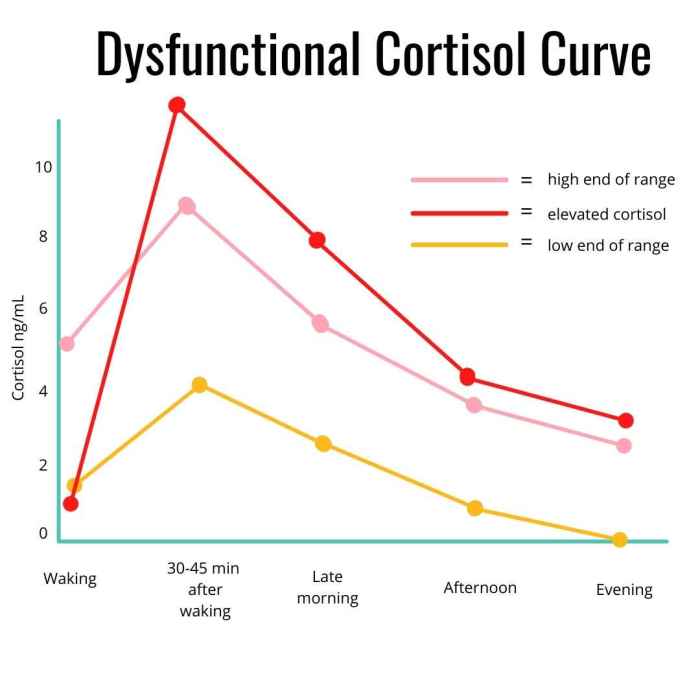
In conclusion, effectively lowering cortisol levels involves a multifaceted approach that goes beyond simple solutions. This guide has explored the intricate connection between stress, lifestyle, and cortisol regulation, providing you with a comprehensive understanding of how to approach this important health concern. By implementing the natural methods, lifestyle adjustments, and dietary considerations discussed, you can take proactive steps towards better cortisol management and overall well-being.
Remember, consistency and a holistic approach are key to long-term success.
